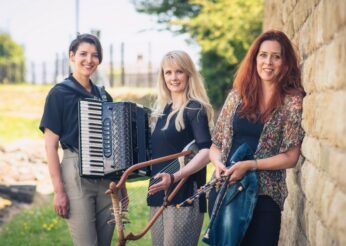He’s a self-described “street kid” from the Bronx who bailed on college and big city life for a cold-water cabin in Virginia in the 1970s. His mission? To soak up the passion that was dramatically upending his parent’s life plan for him – authentic Appalachian mountain music – at the feet of its legendary pioneers, old masters who are now long gone.
Today, Bruce Molsky is one of the most revered “multi-hyphenated career” ambassadors for America’s old-time mountain music. For decades, he’s been a globetrotting performer and educator, a recording artist with an expansive discography including seven solo albums, well over a dozen collaborations and two Grammy-nominations. He’s also the classic “musician’s musician” – a man who’s received high praise from diverse fans and collaborators like Linda Ronstadt, Mark Knopfler, Celtic giants Donal Lunny and Andy Irvine, jazzer Bill Frisell and dobro master Jerry Douglas, a true country gentleman by way of the Big Apple aptly dubbed “the Rembrandt of Appalachian fiddlers” by virtuoso violinist and sometimes bandmate Darol Anger.
Molsky digs deep to transport audiences to another time and place, with his authentic feel for and the unearthing of almost-forgotten rarities from the Southern Appalachian songbook. His foils are not only his well-regarded fiddle work, but banjo, guitar and his distinctly resonant vocals. From tiny folk taverns in the British Isles to huge festival stages to his ongoing workshops at the renowned Berklee College of Music, Molsky seduces audiences with a combination of rhythmic and melodic virtuosity and relaxed conversational wit – a uniquely humanistic, downhome approach that can make Carnegie Hall feel like a front porch or parlour jam session.
In addition to his many live performances as a solo and with Molsky’s Mountain Drifters, Bruce is a Visiting Scholar at the old American Roots Music Program at the Boston’s Berklee College of Music, and conducts fiddling workshops and summer music camps for devotees in the US and overseas.
Through his teenage years, Molsky honed his skills at nurturing folk gatherings in New York and the Northeast, including the annual Fiddlers’ Convention at South Street Seaport. Hoping to please his engineer father, Molsky began studying architect and engineering at Cornell. A blow to these designs was the folk scene at and around Cornell, which only served to deepen his interest in, and ultimate pilgrimage to, the roots of early rural music.
Molsky’s recording career has been plentiful since his debut session banjoist with Bob Carlin in 1990, with nearly two dozen releases available via Rounder and Compass Records and his own Tree Frog Music. His discography includes seven solo albums, from his debut of fiddlers’ classics, “Warring Cats,” to his most recent, “If It Ain’t Here When I Get Back,” an “aural autobiography” paying tribute to the musicians who have shaped his musical life and his travels from Appalachia to Australia. There’s also the Grammy-nominated “Fiddlers 4,” with Darol Anger, Michael Doucet and cellist Rushad Eggleston, the debut of the world fusion ensemble Mozaik with Andy Irvine, and contributions to legendary guitarist Mark Knopfler’s “Tracker” and the Billboard chart-topping Anonymous 4 release, “1865 – Songs of Hope and Home from the American Civil War.”

Information on transport to Bantry, accommodation, wining, dining and entertainment
Tourist InformationCopyright © 2024 West Cork Music. All rights reserved.
Designed and developed by Matrix Internet